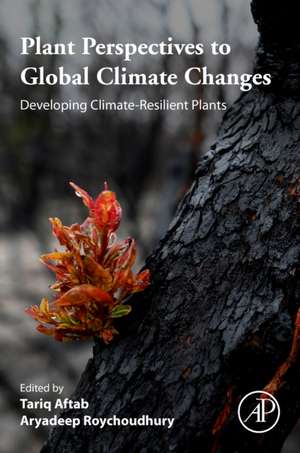Plant Perspectives to Global Climate Changes: Developing Climate-Resilient Plants
Editat de Tariq Aftab, Aryadeep Roychoudhuryen Limba Engleză Paperback – 30 sep 2021
Advancing ecophysiological understanding and approaches to enhance plant responses to new environmental conditions is critical to developing meaningful high-throughput phenotyping tools and maintaining humankind’s supply of goods and services as global climate change intensifies.
- Illustrates the central role for plant ecophysiology in applying basic research to address current and future challenges for humans
- Brings together global leaders working in the area of plant-environment interactions and shares research findings
- Presents current scenarios and future plans of action for the management of stresses through various approaches
Preț: 907.98 lei
Preț vechi: 997.77 lei
-9% Nou
Puncte Express: 1362
Preț estimativ în valută:
173.74€ • 189.49$ • 146.50£
173.74€ • 189.49$ • 146.50£
Carte tipărită la comandă
Livrare economică 17 aprilie-01 mai
Preluare comenzi: 021 569.72.76
Specificații
ISBN-13: 9780323856652
ISBN-10: 0323856659
Pagini: 556
Dimensiuni: 191 x 235 mm
Editura: ELSEVIER SCIENCE
ISBN-10: 0323856659
Pagini: 556
Dimensiuni: 191 x 235 mm
Editura: ELSEVIER SCIENCE
Cuprins
1. Climate change impact on plants: Plant responses and adaptations
2. Towards understanding abiotic stress physiological studies in plants: Conjunction of genomic and proteomic approaches
3. Co-overexpression of genes in plants for abiotic stress tolerance
4. Molecular investigation of plant-environment interaction at functional level
5. Physiological, biochemical, and molecular adaptation mechanisms of photosynthesis and respiration under challenging environments
6. Harnessing the potential of modern omics approaches to study plant biotic and abiotic stresses
7. Soil-plant interactions for agricultural sustainability under challenging climate change
8. Biological nitrification inhibition for sustainable crop production
9. Application of nanoparticles in developing resilience against abiotic stress in rice plant (Oryza sativa L.)
10. Physiological mechanisms and adaptation strategies of plants under nutrient deficiency and toxicity conditions
11. Genomics-based approaches to improve abiotic stress tolerance in plants: Present status and future prospects
12. Transcription factors involved in plant responses to heavy metal stress adaptation
13. The role of soil microorganisms in plant adaptation to abiotic stresses: Current scenario and future perspectives
14. Ecological aspects of the soil-water-plant-atmosphere system
15. Role of miRNAi technology and miRNAs in abiotic and biotic stress resilience
16. CRISPR-Cas9-mediated genome editing technology for abiotic stress tolerance in crop plant
17. Reactive oxygen and nitrogen species: Antioxidant defense studies in plants
18. Role of plant hormones in combating biotic stress in plants
19. CRISPR-mediated genome editing for developing climate-resilient monocot and dicot crops
20. Mechanism of temperature stress acclimation and the role of transporters in plants
21. Role of β-aminobutyric acid in generating stress-tolerant and climate-resilient plants
22. Wild relatives of plants as sources for the development of abiotic stress tolerance in plants
23. Role of magnetopriming in alleviation of abiotic stress in plants
2. Towards understanding abiotic stress physiological studies in plants: Conjunction of genomic and proteomic approaches
3. Co-overexpression of genes in plants for abiotic stress tolerance
4. Molecular investigation of plant-environment interaction at functional level
5. Physiological, biochemical, and molecular adaptation mechanisms of photosynthesis and respiration under challenging environments
6. Harnessing the potential of modern omics approaches to study plant biotic and abiotic stresses
7. Soil-plant interactions for agricultural sustainability under challenging climate change
8. Biological nitrification inhibition for sustainable crop production
9. Application of nanoparticles in developing resilience against abiotic stress in rice plant (Oryza sativa L.)
10. Physiological mechanisms and adaptation strategies of plants under nutrient deficiency and toxicity conditions
11. Genomics-based approaches to improve abiotic stress tolerance in plants: Present status and future prospects
12. Transcription factors involved in plant responses to heavy metal stress adaptation
13. The role of soil microorganisms in plant adaptation to abiotic stresses: Current scenario and future perspectives
14. Ecological aspects of the soil-water-plant-atmosphere system
15. Role of miRNAi technology and miRNAs in abiotic and biotic stress resilience
16. CRISPR-Cas9-mediated genome editing technology for abiotic stress tolerance in crop plant
17. Reactive oxygen and nitrogen species: Antioxidant defense studies in plants
18. Role of plant hormones in combating biotic stress in plants
19. CRISPR-mediated genome editing for developing climate-resilient monocot and dicot crops
20. Mechanism of temperature stress acclimation and the role of transporters in plants
21. Role of β-aminobutyric acid in generating stress-tolerant and climate-resilient plants
22. Wild relatives of plants as sources for the development of abiotic stress tolerance in plants
23. Role of magnetopriming in alleviation of abiotic stress in plants
